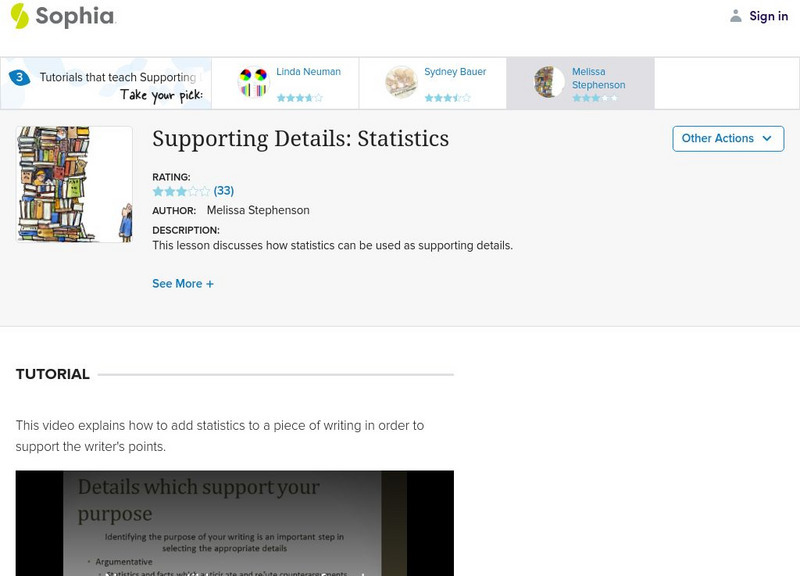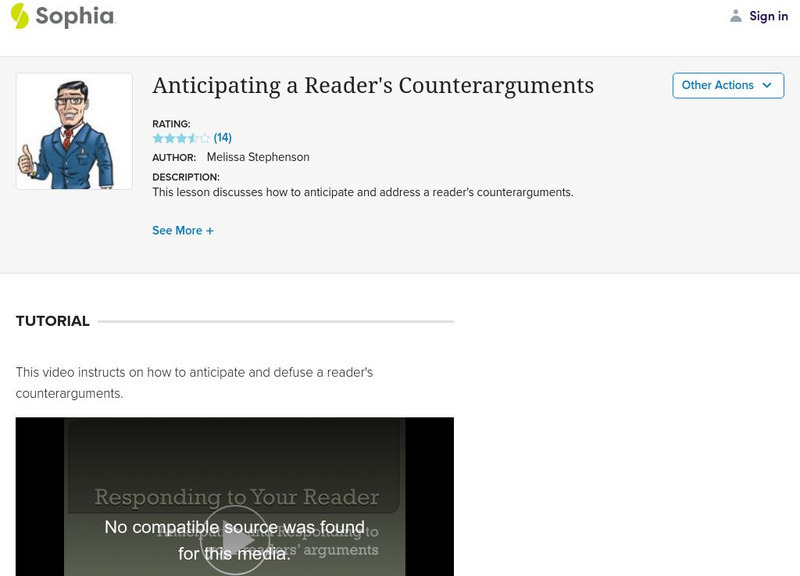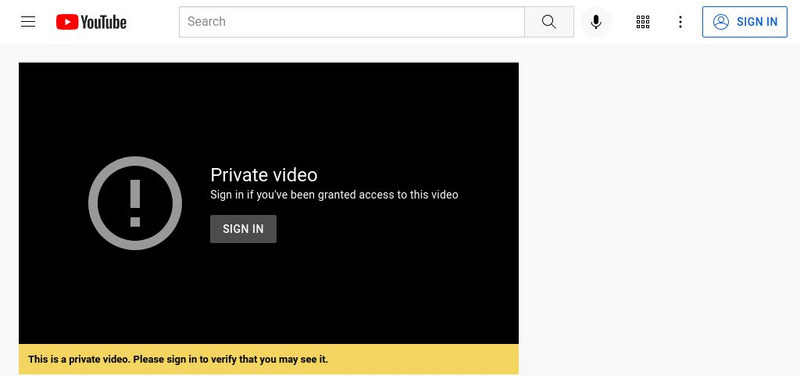TED-Ed
A Day in the Life of a Roman Soldier
The Roman army, like Gaul, was divided into three parts: legions, cohorts, centuries. Viewers experience a day in the life of Servius Felix, a legionary in the Roman army, as they watch an informative video.
TED-Ed
A Day in the Life of an Ancient Athenian
To learn more about life in ancient Greece, viewers spend a day with Athenians Archias and his wife, Dexileia. Viewers learn about Archias's household and observe the roles of his wife, his children and their tutors, and his slaves. Then...
Ophea
Applying Physical & Health Literacy
Raise teenagers' awareness about the importance of living an active life and staying physically fit by using this short health video. Starting with a series of facts about the negative consequences of physical...
Ophea
Exploring Physical & Health Literacy
Help students discover the importance of physical fitness with this health literacy video. Beginning with a comparison of the choices made by two fictional teenagers, this resource continues on to explore the basic...
TED-Ed
The Hidden Power of Smiling
Smiling is something we may do every day and can appear benign, yet this common expression has more health benefits and psychological/physical implications than we realize! Using historical quotes, scientific studies, and a vast range of...
TED-Ed
A Call to Invention: DIY Speaker Edition
Can you build a homemade speaker out of a potato chip? Bestselling author and do-it-yourself expert William Gurstelle shows you how in his brief presentation at TEDYouth 2012. He encourages young people to be creative and explore...
TED-Ed
How Do We Smell?
It seems like a simple process: we breathe in, our nose detects different scents, and our brain interprets the smell. But how does it actually work? How can something smell like vanilla to one person, but like urine to someone else?...
TED-Ed
A Rare, Spectacular Total Eclipse of the Sun
According to some ancient Mesopotamians, "The sun was put to shame" during a 14th century total solar eclipse. How can the moon, which is 400 times smaller than the sun, completely cover it? This video demonstrates the answer...
TED-Ed
Why Can't we See Evidence of Alien Life?
With so indescribably many stars and planets in existence, certainly we aren't alone in the universe! Or are we? Strangely, we haven't discovered any hints of life beyond Earth. The contradiction, known as the Fermi paradox, is...
TED-Ed
Dark Matter: How Does it Explain a Star's Speed?
Studying spiral galaxies can make your head spin! With this video, find out how astronomers calculate a galaxy's rotational speed, and how the prediction that the outermost stars slow down does not seem to be true. The mystery may be...
TED-Ed
The Moon Illusion
Does the moon change size? It sure looks like it! Two optical illusions are suggested as an explanation: Ebbinghaus and Ponzo. However, there are problems with both of these. Convergence micropsia may answer the question, but many...
Sophia Learning
Sophia: Argumentative Papers
This video lesson explains the purpose of argumentative papers and the construction of paper as follows: thesis states claim, evidence supports claim, identify counterargument, evidence refutes counterargument, and conclusion restates...
Sophia Learning
Sophia: Argumentative Papers: Opposing Arguments
This video lesson focuses on when and how to address opposing arguments in an argumentative paper. It begins with a warning about acknowledging opposing viewpoints and then offers a method if you choose to do so: build common ground,...
New Zealand Ministry of Education
Te Kete Ipurangi: Thinking and Reading Comprehension
Julie Cowan from Willowbank School explains how she supports students to become strategic, reflective, and metacognitive readers and thinkers.
Sophia Learning
Sophia: Conditionals
This video defines conditionals, explains how to identify and write the three different types of conditional statements: factual, predictive, and speculative. It also discusses modal verbs and provides a list of them. [6:24]
Sophia Learning
Sophia: Supporting Details: Statistics
A lesson with audio discussing how analogies can be used as supporting details. [4:00]
Sophia Learning
Sophia: Anticipating a Reader's Counterarguments
A screen cast lesson explaining how to anticipate when a reader might disagree with the author and how, as an author, to address the counterarguments when writing a persuasive/argumentative piece. [6:48] CCSS.ELALiteracy.CCRA.W.1,...
Imagine Learning Classroom
Learn Zillion: Infer and Cite Evidence of Character Traits
In this lesson, you will infer and cite evidence of character traits that the author shows, rather than tells, by making generalizations about the main character. [4:14]
Imagine Learning Classroom
Learn Zillion: Develop a Claim
In this lesson, you will learn how to generate a precise claim by analyzing your text and notes for reasons and evidence. [7:29]
Imagine Learning Classroom
Learn Zillion: Strengthen Argumentative Writing by Identifying an Opposing Claim
In this lesson, you will learn how to strengthen your argument by identifying the opposing claim and arguing against it. [4:34]
Imagine Learning Classroom
Learn Zillion: Develop Support for an Argument in Opinion Writing
In this lesson, you will learn how to support your argument by turning the topic sentence into a question. [4:51]
McGraw Hill
Mc Graw Hill: Introduction to Reading Skills: Claims and Support
This engaging video highlights the importance of providing reasons and evidence to support a claim. [2:41]
McGraw Hill
Mc Graw Hill: Introduction to Reading Skills: Claims and Supporting Evidence 2
This video highlights the importance of supporting claims with evidence. [2:35]
Imagine Learning Classroom
Learn Zillion: Identify Relevant Evidence
Students will be able to identify relevant evidence in their argumentative writing. [7:12]























